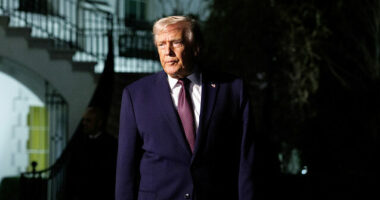Share this @internewscast.com
Dictionary.com has revealed its Word of the Year, and it’s likely not one you’ll find in many vocabularies.
On October 29, the popular online dictionary introduced “6 7” as its chosen word for the year.
If you’re not in close contact with the younger generation, particularly Gen Alpha, you might not be aware of “6 7” (pronounced “six seven”). This quirky expression has gained such popularity among schoolchildren that it has even led schools to prohibit its use.
So, what exactly does “6 7” mean? According to Dictionary.com, the answer is a bit elusive.
“The most notable aspect of 67 is its lack of a clear definition,” the announcement explained. “It’s a term that is both meaningless and universally used, with an air of nonsense.”
Some interpretations suggest it conveys a sense of ambiguity, like “so-so” or “maybe this, maybe that.” It’s often accompanied by a shrugging hand gesture where palms face upward and alternate in movement. Additionally, it can be used as an exclamatory remark.
Dictionary.com described the phrase as “classic brainrot slang: purposefully nonsensical, endlessly remixable and all about being in on the absurdity.”
“Few slang terms have captured the cultural mood of 2025 quite like 67,” Steve Johnson, PhD, Director of Lexicography for the Dictionary Media Group at IXL Learning, said in a statement.
“It’s part inside joke, part social signal and part performance. When people say it, they’re not just repeating a meme; they’re shouting a feeling. It’s one of the first Words of the Year that works as an interjection, a burst of energy that spreads and connects people long before anyone agrees on what it actually means.”
People on social media were baffled by the choice.

“when did 67 become a word?” someone asked.
“Since when is a number a word? God, I hate kids,” one added.
“A word with no definition. Nice,” another sarcastically wrote.
“We’re cooked,” one said. “We were supposed to be advancing as a civilization, but right now we are regressing.”
“The least serious dictionary ever,” a user declared.
“That’s like a man being named woman of the year,” another joked.
To select 67 as the word of the year, Dictionary.com’s lexicographers looked for words that “made an impact on our conversations” by analyzing data such as newsworthy headlines, social media trends, search engine results and more.
Dictionary.com’s Word of the Year and short-listed nominees are meant to “capture pivotal moments in language and culture” and “serve as a linguistic time capsule.”
Beginning in the summer of 2025, searches for “67” dramatically increased, and since June, those search numbers have increased more than sixfold.
It’s unclear exactly where and how 67 originated. Some link it back to a song called “Doot Doot (6 7)” by Skrilla, and others bring it back to NBA player LaMelo Ball, who is 6ft 7in.
A TikTok of a video discussing the Charlotte Hornets point guard’s height had the “67” lyric from “Doot Doot” dubbed over it, and it quickly went viral with 10.1 million views and 1.3 million likes as of Oct. 30.

However, 67 isn’t the only term that dominated culture this year. Other words on Dictionary.com’s shortlist for 2025 include agentic, aura farming, broligarchy, clanker, Gen Z stare, kiss cam, overtourism, tariff and trad wife.
Another non-word that made the short list is the dynamite emoji, which traditionally represents dynamite, a firecracker or TNT. The emoji took on a new meaning in 2025 following the engagement of Taylor Swift and Travis Kelce as social media users playfully rebranded the emoji as shorthand for the couple –“T ‘n’ T,” or “T & T.”
















